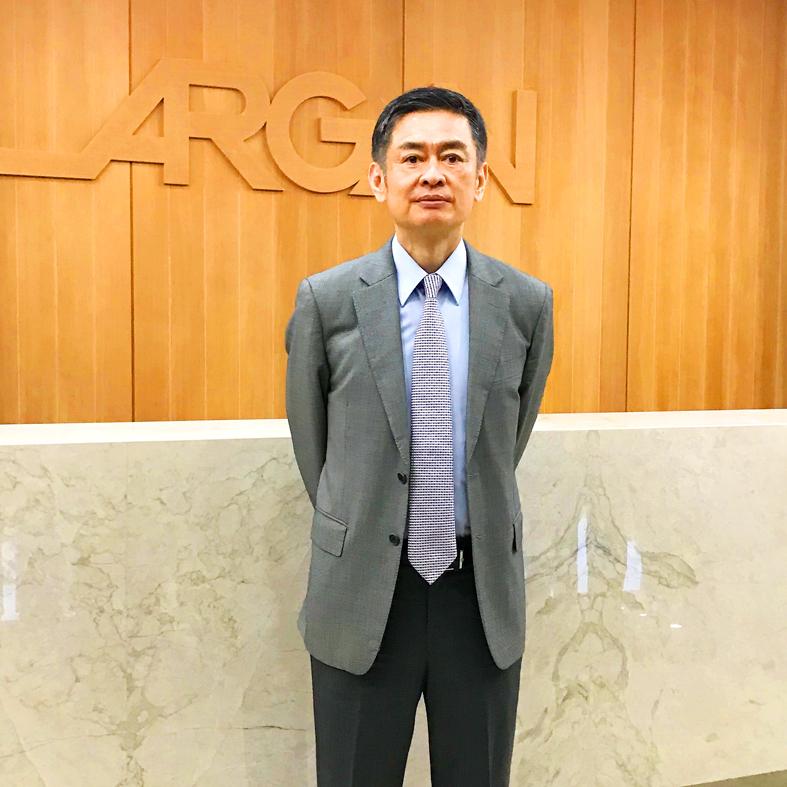Smartphone camera lens maker Largan Precision Co (大立光) has sued Motorola Mobility LLC for patent infringement, the Apple Inc supplier said on Monday.
Largan said it has filed a lawsuit with a court in the Northern District of California, accusing Motorola Mobility, which is under the corporate umbrella of China’s Lenovo Group Ltd (聯想), of infringing on six patents related to 5G smartphone camera lens production.
While Largan did not elaborate on its claims, the company reiterated its determination to safeguard its intellectual property rights through legal action.

Photo: Chen Mei-ying, Taipei Times
Local media reported on Monday that the lawsuit involved patents for super-wide-angle lenses infringed upon by the front and rear camera lenses used by Motorola Mobility in its One 5G Ace model.
Motorola Mobility, a spinoff of Motorola Inc, was sold in 2011 to Google, which then sold the mobile phone assets to Lenovo in 2014.
Motorola Mobility was the third-largest smartphone vendor in the US in the first nine months of this year, with a market share of 8 percent, behind Apple’s 43 percent and Samsung Electronics Co’s 35 percent.
Largan has resorted to legal action to protect its intellectual property rights in the past.
In 2013, Largan sued Taiwanese rival Genius Electronic Optical Co (玉晶光) in a court in the US for infringing on five patents involving smartphone camera lenses, and sued Samsung, also in a US court, accusing it of stealing six smartphone camera lens patents.
In 2019, Largan turned its attention to the notebook computer market by suing HP Inc and Taiwanese camera lens makers Ability Opto-Electronics Technology Co (先進光電) and Newmax Technology Co (新鉅科) in a US court, accusing them of infringing on four of its patents.
Those intellectual property right disputes were all settled with royalties received by Largan.
As for the lawsuit against Samsung, Largan secured large orders from the South Korean company through a settlement agreement.
Analysts said the lawsuit brought against Motorola Mobility by Largan aimed to fend off competition from the so-called “red supply chain” in China as it tries to expand its market share in that market.

To many, Tatu City on the outskirts of Nairobi looks like a success. The first city entirely built by a private company to be operational in east Africa, with about 25,000 people living and working there, it accounts for about two-thirds of all foreign investment in Kenya. Its low-tax status has attracted more than 100 businesses including Heineken, coffee brand Dormans, and the biggest call-center and cold-chain transport firms in the region. However, to some local politicians, Tatu City has looked more like a target for extortion. A parade of governors have demanded land worth millions of dollars in exchange

An Indonesian animated movie is smashing regional box office records and could be set for wider success as it prepares to open beyond the Southeast Asian archipelago’s silver screens. Jumbo — a film based on the adventures of main character, Don, a large orphaned Indonesian boy facing bullying at school — last month became the highest-grossing Southeast Asian animated film, raking in more than US$8 million. Released at the end of March to coincide with the Eid holidays after the Islamic fasting month of Ramadan, the movie has hit 8 million ticket sales, the third-highest in Indonesian cinema history, Film

Taiwan Semiconductor Manufacturing Co’s (TSMC, 台積電) revenue jumped 48 percent last month, underscoring how electronics firms scrambled to acquire essential components before global tariffs took effect. The main chipmaker for Apple Inc and Nvidia Corp reported monthly sales of NT$349.6 billion (US$11.6 billion). That compares with the average analysts’ estimate for a 38 percent rise in second-quarter revenue. US President Donald Trump’s trade war is prompting economists to retool GDP forecasts worldwide, casting doubt over the outlook for everything from iPhone demand to computing and datacenter construction. However, TSMC — a barometer for global tech spending given its central role in the

Alchip Technologies Ltd (世芯), an application-specific integrated circuit (ASIC) designer specializing in server chips, expects revenue to decline this year due to sagging demand for 5-nanometer artificial intelligence (AI) chips from a North America-based major customer, a company executive said yesterday. That would be the first contraction in revenue for Alchip as it has been enjoying strong revenue growth over the past few years, benefiting from cloud-service providers’ moves to reduce dependence on Nvidia Corp’s expensive AI chips by building their own AI accelerator by outsourcing chip design. The 5-nanometer chip was supposed to be a new growth engine as the lifecycle